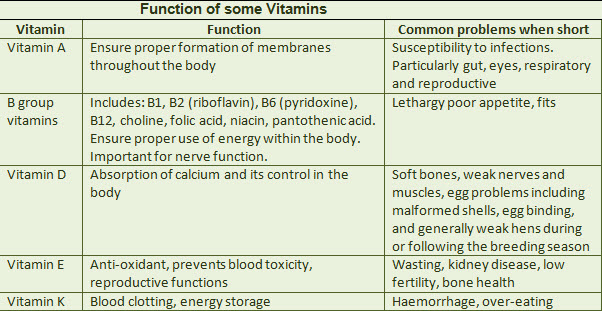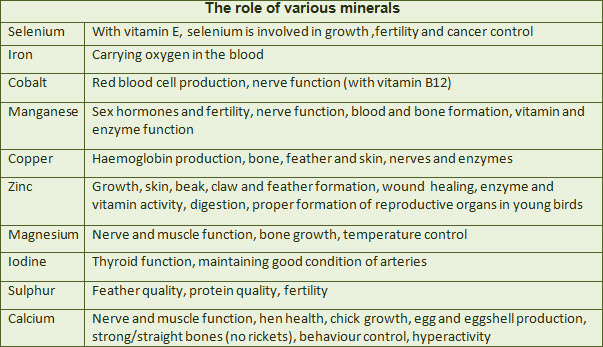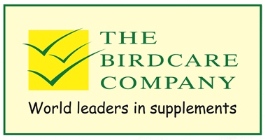The role of different vitamins and minerals in bird keeping
Ever wished your birds wouldn’t get sick?
And it’s always your best birds, isn’t it! Losing hens, losing chicks, losing show champions. So why do they seem to be so vulnerable?
A number of factors are at work.
• Line breeding can cause them to be more vulnerable, but it helps you to work towards the show look you are after
• New stock coming in or birds going to shows can bring infections back to your birdroom
• Birds conceal their illness well until it is far advanced, so you have less time/chance to save them
• Their daily feed impacts on their health. You are what you eat. Your or a bird’s body cannot be made up of elements it has not consumed.
So let’s look at the impact of feed as, out of the four impacts listed above, it is one you can easily adapt to reduce the likelihood of sickness in your birds.
What is in good food that helps to keep sickness at bay?
Let’s take a look at the components of feed. We are not looking here at whether the item of feed is a seed, or an eggfood, or sprouting seeds, but rather what any of these might be made up of, what they might have to offer to your birds.
On our own food, such as packaged items bought in the supermarket, you usually see listed the contents in percentage terms of protein, fats, starch (or energy), fibre, sugar and salt. You are also likely to see some levels of various vitamins or minerals listed. You are not likely to see some of the other elements itemised, such as the amino acids, health giving yeasts, probiotics which foods are comprised of.
So out of all these possibilities let’s take a closer look at vitamins and minerals. They are talked about a lot. But why are they considered so important? What do they do?
Below is a table, by way of example, highlighting some of the key benefits of vitamins and minerals. This table does not purport to be complete! Not in the list of ingredients nor in all the issues that they are important for! But hopefully it will give you an idea of the significance, complexity and diversity of impact that vitamins and minerals can have on health.


This short and incomplete list probably leaves you wondering what you are supposed to offer your birds to help improve their health and to help you lose fewer of your favourite birds. The answer is that picking one vitamin as a top up item is not the answer! This is an approach often favoured by people as it is nice to think there is one magic ingredient that will make all the difference. The truth is that, as you can see from the items in the tables, more than one vitamin or mineral can affect a particular issue. For example, both fertility and nerve and muscle function crop up more than once. These vitamins and minerals alone have many complex interactions in the body and need to work together.
The real answer is that you and your birds need a full and comprehensive blend of all the vitamins and minerals so that the body (yours or your birds) can undertake all the complex interactions that need to go on every hour of every day. Improving the vitamin and mineral profile of your birds’ diets is a great way to get ahead of the game and keep them healthy, which is to say prevent illness in the first place. It’s so much easier than trying to resuscitate them once they have gone down with an infection of some sort.
Let’s look at the typical components of seed
Overall dry seeds, virtually whatever type they are, are great sources of carbohydrates. Carbohydrates provide energy to the body. But dry seeds are seriously lacking in vitamins, minerals and protein. Indeed they contain no vitamin A for example. So the dried seed diets fed to birds kept at home leave them vulnerable to all sorts of health problems developing. It is important to make sure other foods and supplements are provided to help keep them well. Of course, in the wild birds have access to a much more varied diet they can control themselves and they lead vastly more active, not sedentary lifestyles, which also brings benefits not available to birds at home.
So, in summary, what you feed your birds can have an enormous impact on their health and wellbeing, vitality, fertility, feathering quality and ability to overcome illness. And this article just looks at a couple of aspects of nutrition for health.
Products to consider to help you to fitter, healthier birds:
EasyBird Rest, Moult and Show (to add to eggfood or soaked seed) - A broad spectrum mixture of vitamins and minerals, including calcium.
Calcivet (CalciBoost), in powder or liquid. A highly available source of chelated calcium, combined with magnesium and vitamin D3, as these three items interact significantly with each other to bring great health benefits. In our experience, hens need more calcium during the breeding season and Calcivet is a great way to add more to the diet.
Other products that can play a useful role for you in this regard include:
Daily Essentials1 (water soluble, so can be added to drinking water), Daily Essentials3, Guardian Angel and our course our range of Feast eggfoods (Not available to Export markets).
For help to find the product that suits your needs best, ring our advice line: 01453 835330 or 0845 130 8600.
